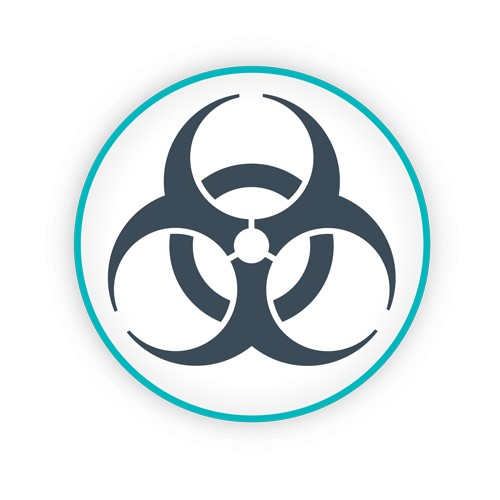How To Handle Hazardous Pharmaceutical Waste In Hospitals

Pharmaceutical waste is one of the most common forms of healthcare waste, and it is generated in a range of settings within a hospital. This category encompasses a diverse range of waste, with the disposal methods and locations often dictated by the chemical composition of the medications or drugs.
Distinguishing between hazardous and non-hazardous medications adds complexity in managing and effectively reducing pharmaceutical waste. However, with a basic understanding of the types of pharmaceutical waste and various disposal strategies, healthcare professionals can create, develop, or refine the right program for their hospital.
TOPICS WE WILL COVER:
- A Brief Review of Pharmaceutical Waste
- How is Pharmaceutical Waste Disposed of and Reduced?
- Navigating Evolving Pharmaceutical Waste Management Practices
- Risks of Improper Disposal of Hazardous Pharmaceutical Waste
- Partner with Experts in Hazardous Pharmaceutical Waste Disposal
A Brief Review of Pharmaceutical Waste
Before exploring how to reduce pharmaceutical waste, it’s crucial to know what pharmaceutical waste is.
It comprises two different waste streams: hazardous pharmaceutical waste and non-hazardous pharmaceutical waste. In the most basic sense, hazardous pharmaceutical wastes are those that are regulated by state or federal health authorities, whereas non-hazardous pharmaceutical wastes are not regulated.
The primary federal statute governing the management of hazardous waste in healthcare facilities is the Resource Conservation and Recovery Act (RCRA) of 1976. For this reason, the relevant wastes are sometimes referred to as RCRA pharmaceuticals (aka hazardous pharmaceuticals) and non-RCRA pharmaceuticals (aka non-hazardous pharmaceuticals).
RCRA vs. Non-RCRA Pharmaceutical Waste
Non-RCRA pharmaceutical waste can be generated through IV preparation, compounding, spills, or breakage; partially used vials, syringes, IVs; and outdated products. Prescriptions or over-the-counter drugs are generally considered non-hazardous as long as they do not include any chemicals regulated through RCRA.
Conversely, many RCRA pharmaceuticals are specifically listed by the Environmental Protection Agency, and are thus always considered hazardous. Pharmaceuticals may also be categorized as hazardous if they are ignitable, corrosive, toxic, or reactive – the four characteristics of hazardous waste pharmaceuticals.
How Is Pharmaceutical Waste Disposed of and Reduced?
In the realm of healthcare, the effective reduction of pharmaceutical waste is not only an environmental concern but also a critical aspect of healthcare facility management.
Understanding how to reduce pharmaceutical waste in hospitals involves several key strategies that can significantly impact waste management:
Segregation and Containment
One pivotal aspect of disposing of pharmaceutical waste involves the segregation of hazardous from non-hazardous waste.
Properly categorizing pharmaceutical waste not only ensures compliance with environmental regulations but also aids in directing waste towards the most appropriate disposal methods. Hospitals must have clear guidelines and labeled containers to facilitate this segregation, thereby reducing the risk of contaminating non-hazardous waste with pharmaceutical hazardous waste. Rest assured, there are plenty of resources available for those wondering what color container hazardous pharmaceutical waste belongs in.
Inventory Management and Analysis
Another key strategy in reducing pharmaceutical waste involves meticulous inventory management and purchasing adjustments. By leveraging detailed usage reports, often from computerized inventory management systems, healthcare facilities can gain insights into the demand for various pharmaceuticals. This analysis enables them to adjust their purchasing decisions, ensuring they order appropriate dosages and quantities.
Unit Dosing
One effective strategy for reducing pharmaceutical waste involves the repackaging of drugs into unit doses. Typically, medical facilities purchase medications in large quantities, which can often lead to surplus and wastage. By dividing these bulk supplies into smaller, unit doses, it becomes easier to manage inventory and reduce the likelihood of excess medications expiring or going unused. This method not only ensures that the right amount of medication is available for patients but also significantly cuts down on pharmaceutical waste.
Switching to Pharmaceutical Products with a Higher Shelf Life
Additionally, facilities can consider switching to premixed products, which typically offer a longer shelf life compared to reconstituted products. Such measures not only help in managing the stock more efficiently but also play a significant role in decreasing the amount of expired or unused medications, thereby contributing to waste reduction.
Staff Training
Educating healthcare staff on the correct methods of hazardous pharmaceutical waste disposal is paramount. Continuous training programs can equip staff with the knowledge to identify different types of waste and understand the procedures for proper disposal. This education is not only about compliance but also about instilling a culture of responsibility towards pharmaceutical waste management and reduction.
Safe Transport
Once the sealed containers are full or reach their designated collection time, trained professionals remove them from the facility. These specialists are equipped to handle both non-hazardous and hazardous materials safely and are knowledgeable about the regulations governing their transport. Keep in mind that hazardous pharmaceutical waste is transported in specially equipped vehicles designed to prevent spills or leaks during transit. These vehicles often have tracking systems to ensure the waste reaches its intended destination.
Navigating Evolving Pharmaceutical Waste Management Practices
As healthcare facilities adapt to changing regulations and environmental concerns, the new normal in pharmaceutical waste management involves more stringent practices and innovative solutions, especially for hazardous pharmaceutical waste.
Risks of Improper Disposal of Hazardous Pharmaceutical Waste
Understanding the consequences of improper pharmaceutical disposal is crucial for healthcare facilities, particularly when it comes to hazardous pharmaceutical waste. Improper disposal of hazardous pharmaceutical waste can lead to severe environmental contamination, legal/financial penalties, and potential health risks.
Partner with Experts in Hazardous Pharmaceutical Waste Disposal

The best bet is to implement a pharmaceutical waste reduction and segregation policy in partnership with a dedicated waste partner like Daniels Health. If you’re unsure about details, like what the correct color container for hazardous pharmaceutical waste is, we are here to help.
With decades of experience in auditing facilities, designing bespoke waste reduction and disposal plans, and training healthcare workers, Daniels Health is well equipped to support your facility’s needs. Whether it’s through the implementation of a formulary analysis or the introduction of the Pharmasmart container system, there are many ways to improve your pharmaceutical waste reduction program in order to lower costs and your regulatory burden as a healthcare provider.
Get in touch to experience the effectiveness of our pharmaceutical waste reduction and management strategies.
Let's Talk!
Your time is valuable, and we don’t want to play hard to get. You can either phone us directly on the details listed on our contact page, or feel free to fill out this short form and one of our team members will get back to you as quickly as possible.
